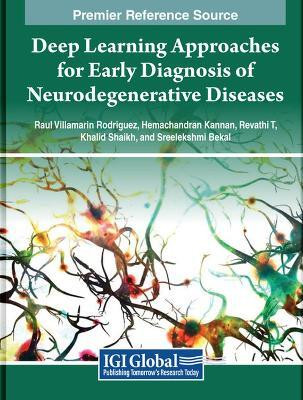Deep Learning Approaches for Early Diagnosis of Neurodegenerative Diseases(English, Hardcover, unknown)
Quick Overview
Product Price Comparison
Within the context of global health challenges posed by intractable neurodegenerative diseases like Alzheimer's and Parkinson's, the significance of early diagnosis is critical for effective intervention, and scientists continue to discover new methods of detection. However, actual diagnosis goes beyond detection to include a significant analysis of combined data for many cases, which presents a challenge of several complicated calculations. Deep Learning Approaches for Early Diagnosis of Neurodegenerative Diseases stands as a groundbreaking work at the intersection of artificial intelligence and neuroscience. The book orchestrates a symphony of cutting-edge techniques and progressions in early detection by assembling eminent experts from the domains of deep learning and neurology. Through a harmonious blend of research areas and pragmatic applications, this monumental work charts the transformative course to revolutionize the landscape of early diagnosis and management of neurodegenerative disorders. Deep Learning Approaches for Early Diagnosis of Neurodegenerative Diseases aspires to serve as a comprehensive resource that delves deep into the integration of deep learning methodologies with the intricate terrain of neuroscientific principles for the early detection of neurodegenerative disorders. This book is designed for audiences comprising researchers, clinicians, and professionals straddling the realms of neurology, artificial intelligence, machine learning, and biomedical engineering. It caters to the aspirations of graduate students and postdoctoral researchers engaged in unraveling the mysteries of neurodegenerative diseases. Industry veterans with an eye for developing diagnostic tools and technologies will find a treasure trove of wisdom within its pages. For those with a fervent passion for comprehending the multifaceted applications of deep learning in early disease detection and the desire to propel progress in the field, this book is an invaluable resource. Additionally, policymakers and healthcare administrators, resolute in their mission to enhance diagnostic practices and elevate patient care standards for neurodegenerative disorders, will find this publication both enlightening and thought-provoking. Within the pages, readers will embark through the intricate landscape of neurodegenerative diseases, the fundamental underpinnings of deep learning, the nuances of neuroimaging data acquisition and preprocessing, the alchemy of feature extraction and representation learning, and the symphony of deep learning models tailored for neurodegenerative disease diagnosis. The book also delves into integrating multimodal data to augment diagnosis, the imperative of rigorously evaluating and validating deep learning models, and the ethical considerations and challenges entwined with deep learning for neurodegenerative diseases.


